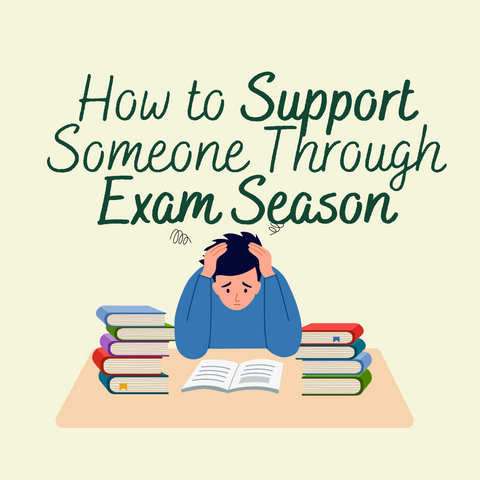How to support your secondary school and college students as they prepare for exam season.
This time of year, can be incredibly stressful for students going through exams - and just as tough for the families and loved ones trying to support them.
In fact, 78% of Leaving Cert students and 81% of Junior Cert students report that exams make them feel stressed, according to research from the Health Promotion Research Centre at NUI Galway
Understand What Exam Stress Really Looks Like
Exam stress isn’t always obvious. It can sneak in quietly, showing up as:
- A sore tummy on school mornings
- Mood swings or irritability over the smallest thing
- Sleepless nights, headaches, or endless “I can’t do this” moments.
It’s not drama. It’s pressure - academic, social, internal - and it can weigh heavily on young shoulders. The key is to listen without fixing and let them know their feelings are valid.
As parents, guardians, or close family members, it’s natural to want to help - but knowing how to help can sometimes feel tricky. Here’s how you can be their steady hand through it all - without burning yourself out in the process.
1. Motivation vs. Pressure: Find the Balance
There’s a fine line between motivating and overwhelming. Constant reminders to study or asking about exam prep can sometimes heighten anxiety rather than ease it. Instead, try to:
- Ask open-ended questions like, “How are you feeling about your next exam?”
- Offer reassurance and listen without judgment.
- Encourage effort over outcome - remind them that their worth isn’t tied to result.
2. Rethink Relaxation - It’s Not Just About Switching Off
Scrolling TikTok or binge-watching a series may offer short-term relief, but true relaxation resets the nervous system.
Encourage active downtime like:
- A 15-minute walk with the dog
- Some deep breathing or yoga (even just a stretch on the bedroom floor)
- Creative time - drawing, journaling, baking, even blasting their favourite playlist and dancing around the room.
Help them see rest not as a reward after work, but a non-negotiable part of doing well.
3. Make Sleep Sacred
Sleep is often the first thing to suffer - but it’s one of the most important things to protect. Late-night cramming might feel productive, but it rarely helps the next day’s performance.
Support better sleep by:
- Encouraging a screen-free buffer zone before bed (try winding down 1–2 hours before lights out)
- Creating a calming space: soft lighting, herbal tea, quiet time
- Exploring supplements like Magnesium Bisglycinate or an L-Theanine & L-Ornithine Complex to calm the mind and body and help give a more deep, restful sleep.
A good night’s sleep makes it easier to concentrate, stay calm, and get through the next study day feeling more balanced.
4. Feed the Brain (and the Mood)
Nutrition might feel like a side note in the exam chaos - but what they eat fuels how they think and how they feel.
Set them up for success with:
- Wholesome meals packed with protein, fibre, and healthy fats.
- Study snacks like nuts, bananas, oat bars or smoothies.
- Hydration - even mild dehydration can make it harder to focus and think clearly.
Consider focus-supporting supplements like L-theanine during high-pressure times, add into pre-exam routine to help bring calm while also allowing the brain to keep focused.
5. Don’t Forget the Support Crew: You
We focus so much on students during exam season, we forget about the silent stress that parents and carers carry too. The worry. The late-night pep talks. The “how do I help without making it worse?” anxiety.
So, here's your reminder: you matter too.
- Talk to other parents - you’re not the only one walking on eggshells right now.
- Take regular breaks for you - even 15 minutes of fresh air can be effective.
- Keep your perspective: no exam is bigger than a person’s wellbeing.
- Practise breathwork or mindfulness and prioritise your own sleep and rest.
Shop our stress support collection here:
Final Thought: Your Presence > Perfection
You might not remember the name of your child’s English novel or how to do long division - and that’s okay. What they’ll remember is how you showed up: with patience, calm, and unconditional support.
This season will pass. But the way you handle it together? That builds connection, confidence and resilience that lasts long after the exams are over.






